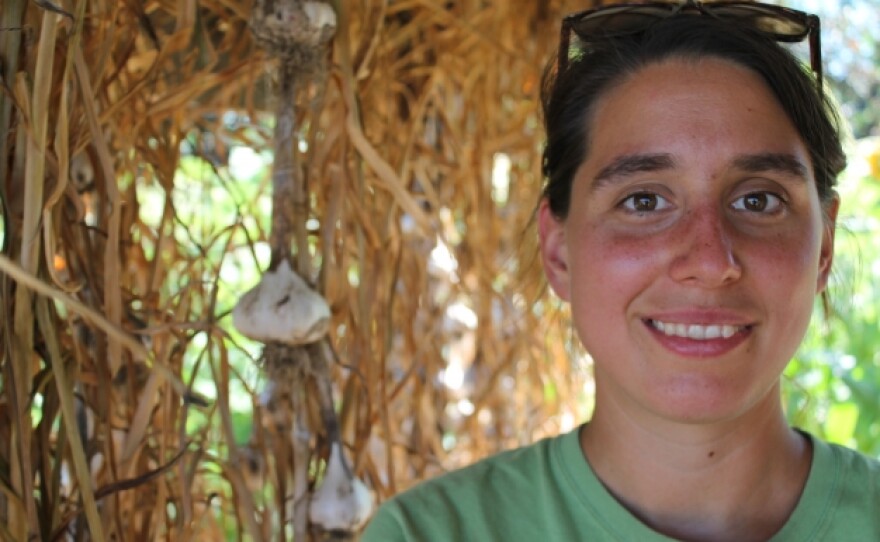Computer science professor GwennVolkert decided she was going to become a goat farmer while on a work trip to Paris. It was the cheese that got her. It was just so much better than anything she could get back home.
“I simply stated as fact: I’m going to make goat cheese,” she says. “And my husband said, ‘I think you’re going to need some goats for that.’ And I said, ‘Well that settles it, we need to get goats.’”
They got the goats. And now, every morning and every evening, Volkert and her husband milk about 50 of them at their farm in northeast Ohio. It’s part of a goat cheese operation that they’ve been building for the past 10 years.
Some of her friends call her crazy for starting the farm.
“My husband and I have our standard line, which is, You’ve got to have a hobby. And this is our hobby. And it’s even now turned into something bigger than that.”
Volkert is part of a trend among women who aren’t necessarily farming to make a living. Instead, they want to provide better food for their families and communities. While the number of farms owned and operated by women has tripled in the U.S. in recent decades, the USDA says most women-owned farms have annual sales of less than $10,000, tend to be smaller and have less acreage. They account for only 3 percent of total U.S. sales.
But there are also many women who want to farm as a full-time career. Carolyn Sachs, a professor of women’s studies at Penn State University and the author of three books on women in agriculture, says many women cringe when they’re called hobby farmers.
“Women are really furious when they’re not taken seriously as farmers,” Sachs says. “It’s said, Oh, it’s just a hobby, they’re just doing this for fun, they’re just doing it for something to do. And all of our women farmers say, Are you kidding me? This is the hardest work I’ve ever done. Why would I do it if it was just for fun? I’m trying to make a living.”
Women farmers have reason to be prickly. Until 2002, the USDA didn’t even count most of them as farmers. Because the farm census only recorded one operator per farm, usually only the husband was counted on many family farms. And when it comes to farm inheritance, Sachs says many farms are still passed from father to son.
But Sachs says women have found an important role helping smaller-to-middle-sized farms transition in a changing economy. She gives the example of a Pennsylvania woman who led her father and husband to transition a failing dairy into a mixed beef and vegetable farm near Harrisburg. Still, she says there are other reasons many women are drawn to running smaller farms: Many never learned how to maneuver or repair tractors, hay wagons and other farm equipment.
“I don’t want to be essentialist in this, but they tend to be engaged in agriculture that doesn’t use large-scale equipment,” she says.
That’s not stopping some in the younger generation.
Near downtown Cleveland, 26-year-old Beth Lomske manages a two-acre demonstration farm, which is owned by the Cleveland Botanical Gardens. It’s alongside a busy road, in the midst of vacant lots and old factories. Today, under her direction, teenage farm workers sit in the shade and clean garlic. But that’s just a taste of what this farm has to offer.
“We have about 800 row feet of potatoes—blue and white,” Lomske says. “We’ve got broccoli, brussel sprouts, cauliflower, basil, popcorn, sweet corn, sunflowers—and that’s just surrounding us in this first front half of the farm.”
Lomske grew up in the country in southwest Ohio, surrounded by huge corn and soybean fields. As a kid, that was her view of farming. And she didn’t like it—particularly all the chemicals and the homogeneous landscape. But in college, she started learning about different kinds of farms that didn’t use chemicals and grew a variety of fruits and vegetables.
“As soon as I started getting into the small, organic farms, the picture started to make sense: Small, diversified farms, taking care of the soil and the land, and an emphasis on community and feeding people. So, from the beginning, I knew it was the right way to go,” she says.
Now, Lomske is part of the new wave of farmers selling direct to customers at farmers markets. But she’s not in this just for fun. It’s her career.
“There’s definitely this myth that you cannot make a living from the land—[that] sustainable agriculture is fun, and it’s a hobby, but you’ll never pay the bills. But that’s totally false.”
Lomske is gaining experience running the demonstration farm, and she plans to break out on her own. She hopes to start an orchard with apples, pears and cherries. Lomske may be a woman, but she really just sees herself as a farmer.








